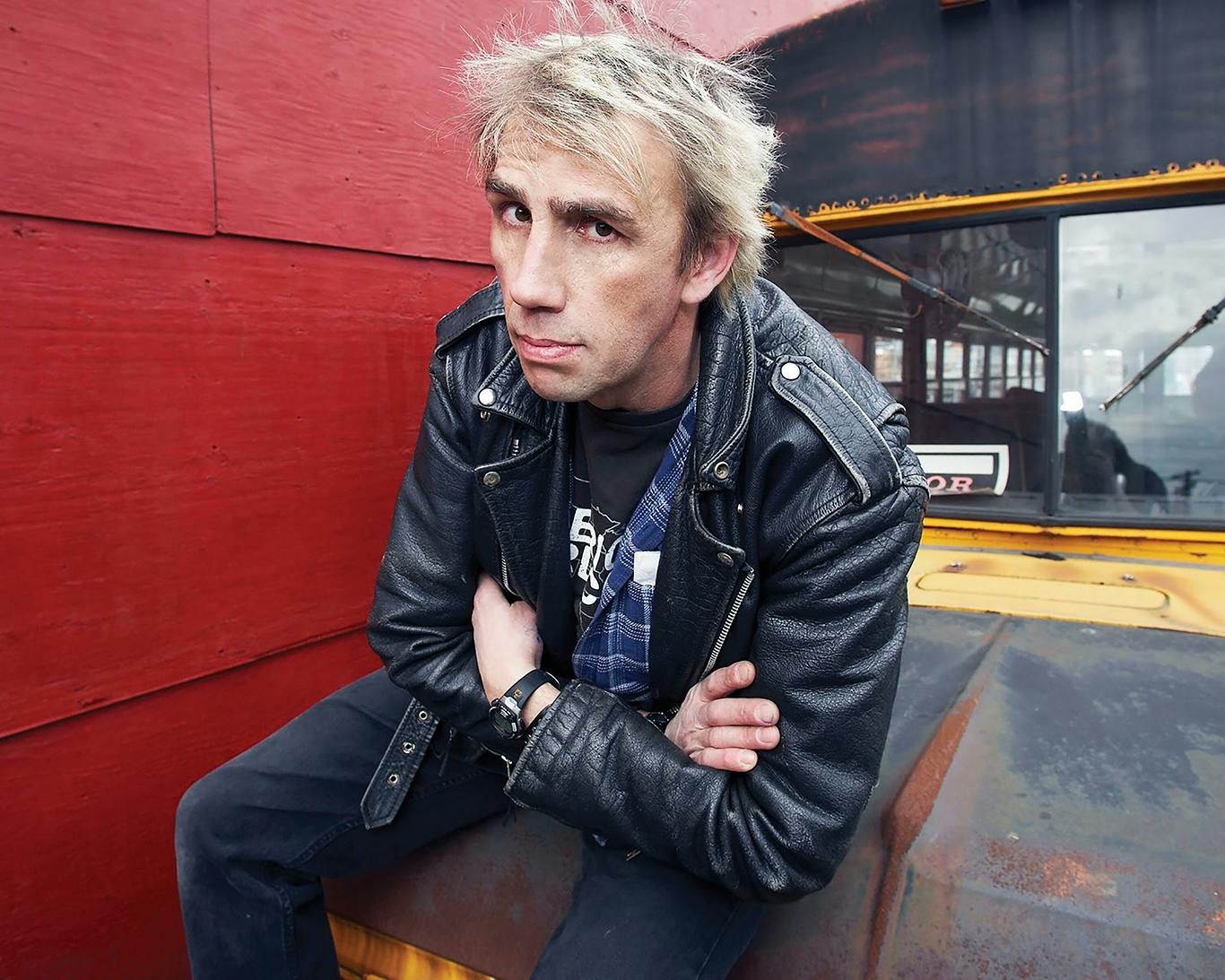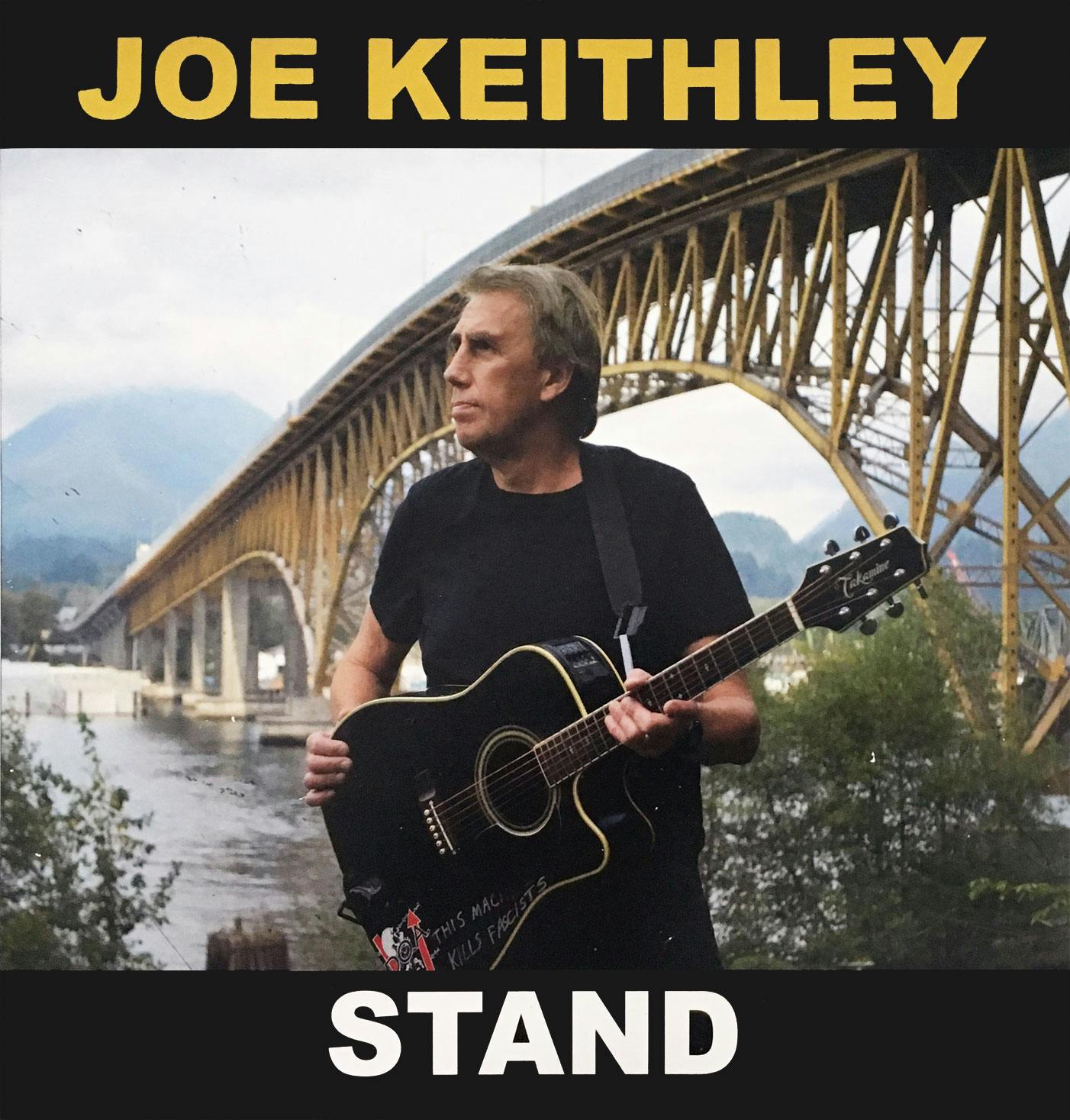Brad Simm
2023-04-04
Long ago, at the Westward Club, one of Calgary’s fabled punk rock rooms in the late 80s-early 90s, a member of D.O.A took the stage wearing a red and black flannel work shirt. Just before the band launched into their set, my friend nudged me and said, “Look, he’s got his Surrey smoking jacket on!”
Joe Keithley laughs, knowing all too well what I’m talking about. A Surrey smoking jacket isn’t a glamorous garment made for lounging around the penthouse. Far from it. Rather, the work shirt attire, made fashionable by Neil Young in the 70s, was then adopted by hordes of skaters and suburban brats as their standard street wear, in particular West Coast punks.
“If you were from Burnaby or East Van, you had a red one. If you were from Surrey, you had a green one. And if you were from North Vancouver, you had a purple one. You gotta get your territory colours right,” jokes Kiethley, D.O.A.’s founding frontman.
Born and bred in Burnaby, Keithley remains loyal to both his home turf, community interests and social activism which is the driving force behind D.O.A and Keithley’s solo work. It’s no surprise Keithley’s also a dedicated politician. In 1996 and 2001 he ran for the Green Party in B.C. and in 2018 was an elected city council member for the Burnaby Green Party, and then reelected in 2022.
As a councillor, Keithley says affordable housing and sustainability are the most pressing issues he and the City of Burnaby are dealing with.
“Top of the agenda, like everywhere else in this country, is housing, the lack of it and lack of money to go forward on it from the federal government, from the provincial government, even though they keep talking big and we have all these zillions [to spend]. But you know, as a city councillor along with Mike Hurley, who’s the mayor, we go, “Fuck, okay. Where is it?’ So that’s the big thing. Politicians can get up and talk about affordable homes, but I think that’s a fantasy in this current economic situation. So what myself and the mayor have really worked on is trying to create a lot more affordable rentals. That’s an attainable thing at this economic point in time.
“The other big thing is being environmentally sustainable. We’re trying to get carbon neutral in the entire city by 2050. But I’m pushing if we can get there by 2035. Because, it’s getting too late. So we gotta, I was gonna say step on the gas, but maybe that’s not the right term,” says Keithley, laughing at his screw up. “Anyway, those are two of the big issues, for sure.”
Taking a stand is nothing new to Keithley, that’s exactly his nature and what he does. That his new solo release is called Stand, perfectly fits the bill for a collection of fiery songs where Keithley either waves a warning flag or shines a light on a cast of characters who have stood committed and courageous before him.
There ain’t no coming down from the fentanyl blues, there ain’t no coming back, you don’t get to choose
— Fentanyl Blues
One of the many tracks that punch through on the record is Fentanyl Blues, Keithley’s eyes wide open account of addiction gone fatal. While the message certainly has a sombre tone, the tune is spirited and rollicking with some scorching, raise-the-roof gospel backups provided by vocalist Frazey Ford.
Keithley notes, “The drug crisis has been going on in our country for a long time, exacerbated by big companies profiting from fentanyl, and then scum weasels selling it and people and dying. I don’t need to tell you the whole story.” He adds the song isn’t just an observation on a serious matter, but rather a call to arms.
“These are not just street people that are dying. These are people that you and I know. If you do drugs by yourself, and you get something like this, what they’re gonna find is your body. Right? It’s a terrible story. I was going to put it on side one [of the record] and just couldn’t, because it was too depressing, even though it’s a really strong song. But I have to say something. I’m not the first, I’m not the last, here’s my two cents on this tragic story. We need education, we need treatment centres, we need to help people, whatever situation you’re in.”
Collaborating with acoustic artist Kennie Starr on the track The Warrior Lives Again, which speaks to centuries of resistance and resilience, Keithley points out how the needle is starting to move in the right direction upholding Indigenous values and culture.
“The thing about this story, it shows how things have changed a little bit for the better. This song was originally on a 1990 D.O.A. album, Murder, and was called The Warrior Ain’t No More where I mentioned what has happened [negatively] to First Nations in Canada, North America and the Western Hemisphere. So I updated the lyrics, and there it is. I think the key thing is that if you’re going to change things, we all got to work together to try and change things … If we’re ever really gonna get to reconciliation.”

Not all of the tracks on Stand delve into tough territory, but they all do cling to a determined dignity which Keithley draws on pop culture and a touch of humour to illustrate. An avid Trekkie fan, Men For All Ages is a great big toast to Captain Kirk, Spock, Scotty and Bones “who knew how to love, and they loved to drink, and under pressure they knew how to think!”
Keithley reveals, “I probably watched every episode from the original series, with William Shatner, five, six, seven, eight times. I did write the song a few years ago. It was a reaction towards how a lot of famous people were just working towards attaining fame, making money, getting bling, riding in big yachts and driving $300,000 cars, Ferraris, whatever. But the core of these [Star Trek] guys, even though it’s just a fictional TV crew, is at the end of the song... “They only stood for honour and never fought for gold.” Wow! Okay, people can take that attitude. And I’m also doing this, because this is the right thing to do. I just thought, even though they’re fictional characters and it’s a TV show, there was a moral lesson. Pretty well every episode stuck with me, obviously, for like 50 years.”
Another film icon that’s stuck a deep chord with Keithley over the years is Clint Eastwood and the Spaghetti westerns he immortalized. Keithley pays high regard to Clint in the track The Man With No Name who says it set the mood to the album and is probably his favourite song on it.
“It’s got a really cool groove. It just tells the story and doesn’t name him. But you know exactly who I’m talking about. Right?”
Keithley admits the characters in Sergio Leone’s low-budget westerns were mostly creepy and “all out for the money,” not exactly an admirable trait. But the western was wild and “ fairness and justice were not necessarily the most prevalent themes of the day, things were pretty raw.” But Clint, as the anti-hero, the vigilante is still held in high esteem. He was the cool in the groove.
“He stands up for the victims but obviously doing it in a rather violent fashion. One scene my youngest son I always talk about, because we watched them a number of times, is where these guys rob a bank and Eastwood’s eating a hot dog all the way through while shooting them up. And then still holding the hot dog at the end. Unbelievable!” Keithley laughs out, adding, “We’re hoping at some point to see the video [for the song], but I’m not sure how my horse riding is. We’ll see.”
Rounding out Stand is another ode to a cultural heavyweight whose legacy continues to spur on the need to hold steady especially in these dark Trumpian undercurrents. This Machine KIlls Fascists channels the socialist warcry of Woody Guthrie and Pete Seeger prompting the question how much have things really changed if we’re still battling the gloomy horsemen still preaching and pushing dictatorships with an ever growing legion of believers.
“When I started out in D.O.A., we were fighting against racism, sexism, weapons for proliferation, greed. And now, 45 years later, we’re fighting against racism, sexism, weapons for proliferation and greed.. Maybe a few things have changed, in the fact that people are more aware of what’s going on. But I don’t think to me, in general, on those key issues of fairness that the world has really improved. I look at the stuff that’s going on, especially over the last five, 10 years, we’re probably in the worst state of anything I’ve seen since the 70s or 80s. There’s more hatred, more oppression, wars are a regular thing... I can’t figure it out. People haven’t learned a goddamn thing is what it seems like. And you know, if we don’t learn from history, we’re doomed to repeat it.”